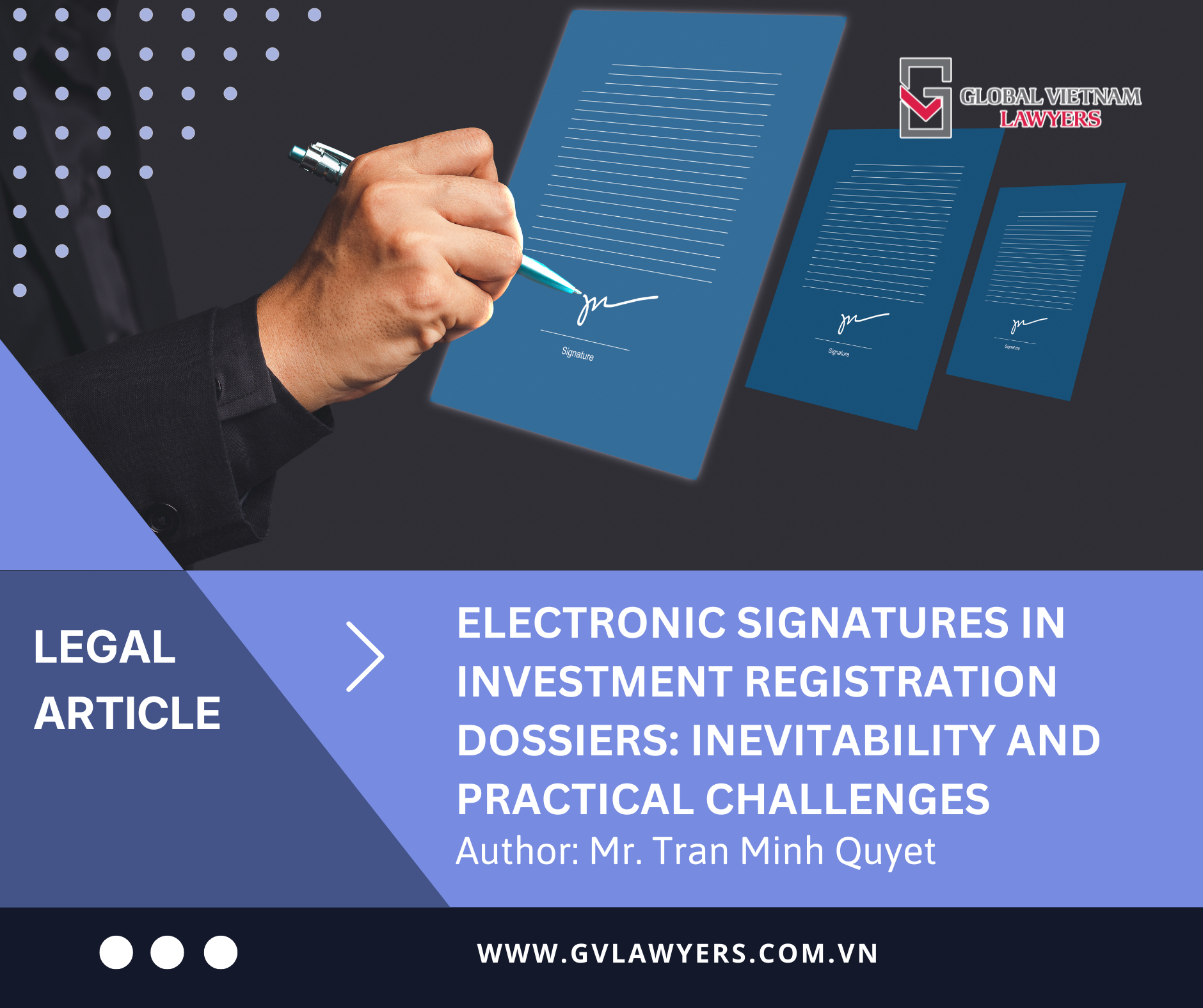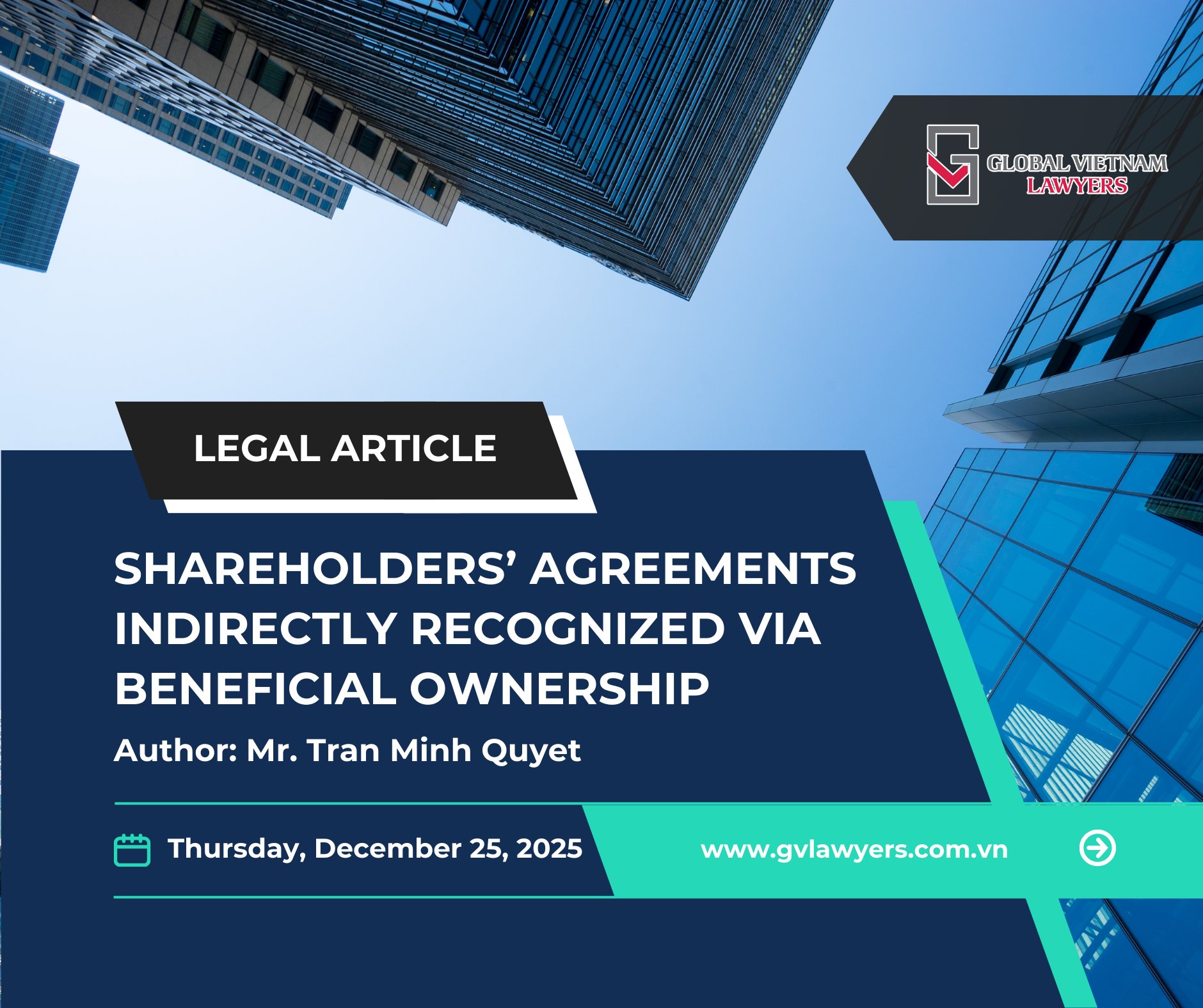GV Lawyers would like to present an article by Mr. Tran Thanh Tung & Ms. Nguyen Thi Phuong Chung, entitled: “5 steps to purchase shares in Vietnamese enterprises” published in Saigon Times on May 12, 2011
***
Shares: In hand but not safe
Through a long relationship, an Indian investor purchased 4% of shares in a local joint stock company. Shares purchase contract has been signed, money has been transferred to account of the selling party, information of the purchasing party has been recorded in shareholder book and the company has issue stocks to the purchase party. Everything seems to be completed.
A long time after that, the company did not mention the distribution of dividend as well as did not convene the shareholder general meeting under the request of the Indian investor. Dispute broke out and the matter was brought to the Department of Planning and Investment (DPI) to be settled. The DPI unexpectedly informed that the purchase of the shares was not legal since the parties had not registered with the DPI when conducting the selling and purchase activity. Therefore, interest of the investor in the company remained a question.
The above is a typical case in which the foreign investor faces problem when purchasing shares in companies in Vietnam.
In studying the reason, we find out that the above problem arises due to the unclearness in the regulation of “shares may be freely transferred” in Item 1 of Article 79 and Item 5 of Article 87 in the Law on Enterprises, as well as the contradiction between the Law on Enterprises and the Law on Investment.
What is “shares to be freely transferred”?
“Shares to be freely transferred” has become a normal concept of many people, especially the investors in securities market. However, the question “What is ‘shares to be freely transferred’?” still confuses a lot of people.
Some people think that “freely transferred” means that the shares may be sold and purchased in writing or by handing without the dependence on any procedure. In other words, the transfer of shares does not need the approval of board of management/shareholder general meeting of the Company or the acceptance of the business registration authority. This understanding leads to the consequence that the relating parties do not pay attention in the procedure when selling and purchasing shares, even do not register the sales with the business registration authority.
However, the opposite opinion asserts that the regulation of “shares to be freely transferred” in Item 1 of Article 79 and Item 5 of Article 87 in the Law on Enterprises mentions only the form of transfer (i.e. transfer in writing or by handing), and does not mention the other issues. That means there is not the absolute freedom and the parties still have to observe the procedures in the company charter and the law, and the transfer shall be registered with the business registration authority.
At present, there has not been any official document interpreting the regulation of “shares to be freely transferred”, so the above argument does not stop.
Observing only the Law on Enterprise: not enough
The Law on Enterprises provides the very simple process of selling shares: the parties agree with each other and request the company to record the name of the purchaser into the shareholder book of the Company. The purchasing party will be deemed as a shareholder of the company upon full payment and the purchaser’s information will be recorded in the shareholder book of the company and the transfer does not have to be registered with the relevant state authority (provided that after the purchase, the shares of the purchasing party comprises less than 5% of total shares of the company, or the selling party is not the founding shareholder).
Therefore, in the above example, the Indian investor thought that once his name recorded in the shareholder book and he kept in hand the stocks issued by the company, he was a shareholder of the Company.
Surely that the parties did observe the process of selling shares in the view point of the Law on Enterprises. However, in the view point of the Law on Investment, the above procedure was still not complete.
According to the Law on Investment, the purchase of shares is deemed as a form of investment (Article 21). Therefore, in principle, the investor when investing in Vietnam in this form will be bound by WTO commitments and Vietnam law (for investors with nationality of the member country of WTO, or when the Vietnam company doing business in industries and fields provided in the WTO commitments), or by Vietnam law (in other cases). The Vietnam State authorities will have to consider the documents of shares purchase to ensure that the investor meets the bindings of WTO and/or Vietnam law (such as the condition of nationality of the investor, proportion of capital contribution, financial status of the investor, industry of the Vietnam enterprise, etc.) Only when the State authority of Vietnam issuing the business registration certificate or the investment certificate recognizes the shares purchase of the foreign investor, such shares purchase is legally authentic according to Vietnam law.
Five steps to purchase shares
In the context of unsufficient guidance on free transfer of shares and the inconsistence between the Law on Enterprises and the Law on Investment, the question that the investors are interested in is: what is a legal process of purchasing shares?
The following is a process of purchasing shares for reference of foreign investors. The process may change under each particular transaction and each local area.
- Open a capital account
This is a mandatory condition when the investor purchase shares of a Vietnamese enterprise.[1] This account will be openned at a commercial bank in Vietnam and shall be registered as a capital account with Vietnam State Bank. All investment activities of the investor shall be carried out through the capital account, including the payment of shares purchase, reception of dividend or money tranfer out of Vietnam.
- Sign the contract of purchasing shares and pay through the capital account
After opening and registering the capital account, the investor may conduct the capital contribution or shares purchase in compliance with provisions of the Law on Enterprises and the Law on Investment.
For listed companies, the investor needs to apply for a trading code to conduct the shares purchase in securities market. The shares purchase of the foreign investors in the securities market shall also observe the provisions of the Law on Securities.
- Register information into the shareholder book and issue the shares certificate
After the investor has paid fully the capital contribution money to purchase the shares, the company will record information of the investor into shareholder book and issue the shares certificate to the foreign investor.
- Register the change of business registration with the license granting authority
The Company shall follow the procedure of business registration to supplement the information of the foreign investor to the business registration of the Company or to the Shareholder change of the Company at the business registration authority. In order to be careful, the Company needs to register the shares purchase of the investor with business registration authority in all cases.
- Register for the issuance of investment certificate to the company
Currently, there has not been detailed guidance on whether or not a local company shall apply for further investment certificate after a foreign investor purchases shares in the company. However, some local areas require the company to register the investment in accordance with the Law on Investment after selling shares to a foreign investor.
[1] Article 6 of Decision 88/2009/QĐ-TTg issued by the Prime Minister on 18 June 2009 regarding the regulations on capital contribution and shares purchase of foreign investors in Vietnamese Enterprises









